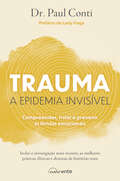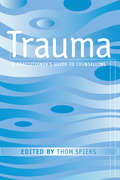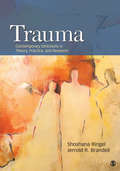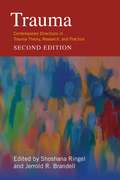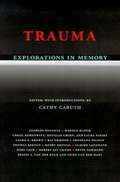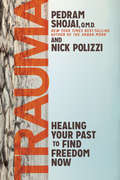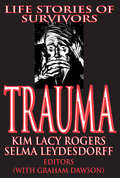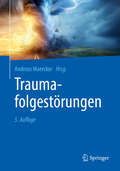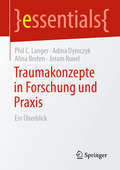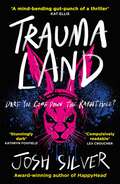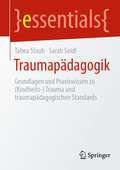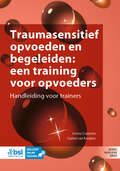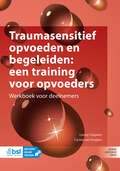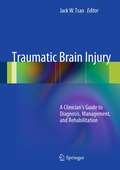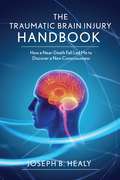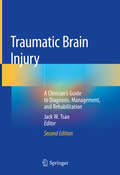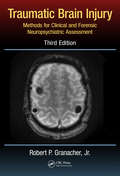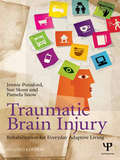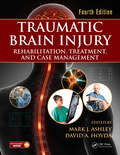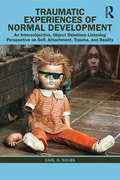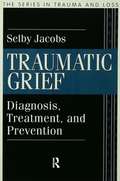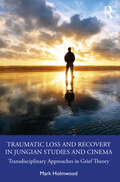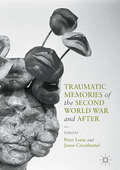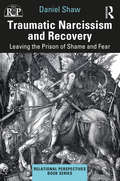- Table View
- List View
Trauma: A Epidemia Invisível
by Paul ContiPrefaciado por Lady Gaga, um livro essencial para compreender, tratar e prevenir todas as feridas emocionais. Partindo da investigação mais recente, das melhores práticas clínicas e de dezenas de histórias reais, este é um livro essencial para perceber a pandemia traumática que vivemos. «Sensatez e paciência prevalecem neste olhar único sobre um assunto amplamente ignorado pela comunidade médica durante anos. É uma leitura obrigatória para profissionais, bem como para quem tenha vivido um trauma ou outro sofrimento psicológico.» Tommy Hilfiger, estilista e empresário «O Dr. Conti é psiquiatra, e alguém que também passou por muita coisa. Isto dá-lhe uma perspetiva única acerca de como as pessoas funcionam e de como os traumas nos modificam, e, especificamente, como o trauma nos leva a pensar e a agir de modo diferente sem que percebamos porquê. O Dr. Conti explica como o trauma interage com a forma como o nosso cérebrotrabalha, e como o trauma é afetado por certos aspetos da sociedade, através de vívidas ilustrações de pessoas reais e das suas vidas. Mas o livro não fica por aí. Fornece também soluções reais — soluções que as pessoas poderão usar para si próprias e para os seus entes queridos,e soluções para ajudar a que o mundo se torne um sítio mais bondoso e seguro.» Kim Kardashian, modelo e empresária «Posso agora dizer com certeza que o Dr. Paul Conti me salvou a vida. Fez com que ela valesse a pena ser vivida. Mas, mais importante, deu-me a capacidade de me redescobrir e de me recuperar.» Lady Gaga, cantora e atriz, in Prefácio «Depois de ler o excelente livro de Paul Conti, percebo agora que o trauma existe em todos nós. Às vezes lembramo-nos dele, mas mesmo quando não conseguimos, ele lembra-se de nós, impedindo-nos de viver as nossas vidas com plenitude. Até que o possamos identificar e clarificar, vivemos com medos, ansiedades e máscaras. O livrode Paul Conti ajuda-nos a identificar o(s) trauma(s) que sofremos nas nossas vidas e a avançar em direção à cura – uma tarefa nada fácil no mundo traumático de hoje.» Carole Bayer Sager, cantora e compositora
Trauma: A Practitioner's Guide to Counselling
by Thom SpiersIn recent years a number of high-profile disasters have heightened public awareness of the impact of trauma. This book offers a comprehensive guide to all aspects of trauma counselling, covering: * trauma assessment * resourcing the trauma client * trauma aftercare * working with trauma in private practice * trauma and the therapist * a brief history of trauma. This practical and effective guide to trauma counselling will be invaluable to counsellors, GPs, social workers, human resource managers, emergency response organisations and all those involved in treating trauma victims using counselling skills.
Trauma: Contemporary Directions in Theory, Practice, and Research
by Dr Jerrold R. Brandell Dr Shoshana S. RingelTrauma: Contemporary Directions in Theory, Practice, and Research is a comprehensive text on trauma, including such phenomena as sexual abuse, childhood trauma, PTSD, terrorism, natural disasters, cultural trauma, school shootings, and combat trauma. Addressing multiple theoretical systems and how each system conceptualizes trauma, the book offers valuable information about therapeutic process dimensions and the use of specialized methods and clinical techniques in trauma work, with an emphasis on how trauma treatment may affect the clinician. Intended for courses in clinical practice and psychopathology, the book may also be useful as a graduate-level text in the allied mental health professions.
Trauma: Contemporary Directions in Trauma Theory, Research, and Practice
by Shoshana Ringel Jerrold R. BrandellAn expanded and revised edition of the first social work text to focus specifically on the theoretical and clinical issues associated with trauma, this comprehensive anthology incorporates the latest research in trauma theory and clinical applications. It presents key developments in the conceptualization of trauma and covers a wide range of clinical treatments.Trauma features coverage of emerging therapeutic modalities and clinical themes, focusing on the experiences of historically disenfranchised, marginalized, oppressed, and vulnerable groups. Clinical chapters discuss populations and themes including cultural and historical trauma among Native Americans, the impact of bullying on children and adolescents, the use of art therapy with traumatically bereaved children, historical and present-day trauma experiences of incarcerated African American women, and the effects of trauma treatment on the therapist. Other chapters examine trauma-related interventions derived from diverse theoretical frameworks, such as cognitive-behavioral theory, attachment theory, mindfulness theory, and psychoanalytic theory.
Trauma: Explorations In Memory
by Cathy CaruthBecause traumatic events are unbearable in their horror and intensity, they often exist as memories that are not immediately recognizable as truth. Such experiences are best understood not only through the straightforward acquisition of facts but through a process of discovering where and why conscious understanding and memory fail. Literature, according to Cathy Caruth and others, opens a window on traumatic experience because it teaches readers to listen to what can be told only in indirect and surprising ways. Sociology, film, and political activism can also provide new ways of thinking about and responding to the experience of trauma. In Trauma and Memory, a distinguished group of analysts and critics offer a compelling look at what literature and the new approaches of a variety of clinical and theoretical disciplines bring to the understanding of traumatic experience. Combining two highly-acclaimed special issues of American Imago edited by Caruth, this interdisciplinary collection of essays and interviews will be of interest to analysts and critics concerned with the notion of trauma and the problem of interpretation and, more generally, to those interested in current discussions of subjects such as child abuse, AIDS, and the effects of historical atrocities such as the Holocaust. Contributions by: Georges Bataille, Harold Bloom, Laura Brown, Cathy Caruth, Kai Erikson, Shoshana Felman, Henry Krystal, Claude Lanzmann, Dori Laub, Kevin Newmark, Onno van der Hart, and Bessel van der Kolk. Interviews with: Robert Jay Lifton, Gregg Bordowitz, Douglas Crimp, and Laura Pinsky
Trauma: Healing Your Past to Find Freedom Now
by Pedram Shojai Nick PolizziYou are not doomed to be trapped by your traumaTrauma is unresolved pain. It hums in the background of our lives and robs us of the joy, faith, peace, and love we fully deserve. In their groundbreaking book, Pedram Shojai, O.M.D., New York Times best-selling author of The Urban Monk and The Art of Stopping Time, and Nick Polizzi, author of The Sacred Science, take you on a journey that encompasses: • a clear understanding of trauma, where it comes from, and how it affects every part of your life • an exploration of modern and ancient therapies and practices for healing • real-life tragedies turning into stories of triumph, hope, and survival Drawn from the wisdom and insights of the world's top doctors, therapists, and experts, Trauma will show you that no matter what you have endured, how long you have carried it, or how deeply embedded it is, you can be free from pain and suffering. Your road to recovery and whole-body healing is before you, and with it the richer and more profound connections that you seek with yourself and your loved ones.
Trauma: Life Stories of Survivors (Routledge Studies In Memory And Narrative Ser. #Vol. 2)
by Selma LeydesdorffTraumatic experiences and their consequences are often the core of life stories told by survivors of violence. In Trauma: Life Stories of Survivors leading academics explore the relationship between the experiences of terror and helplessness that have caused trauma, the ways in which survivors remember, and the representation of these memories in the language and form of their life stories.International case studies include the migration of Ethiopian Jews to Israel, the life stories of Guatemalan war widows, violence in South Africa, persecution of political prisoners in South Africa and the former Czechoslovakia, lynching in the Mississippi Delta, resistance in Zimbabwe's liberation war, sexual abuse, and the ongoing Irish troubles. The volume reveals the complexity of remembering and forgetting traumatic experiences, and shows that survivors are likely to express themselves in stories containing elements that are imaginary, fragmented, and loaded with symbolism. Trauma: Life Stories of Survivors is a groundbreaking work of relevance across the social sciences. This new perspective on trauma will be of particular importance to researchers in psychology, history, women's studies, anthropology, sociology and cultural studies.
Traumafolgestörungen
by Andreas MaerckerGewalterfahrungen, Unfälle, Katastrophen oder Todesfälle im nahen Umfeld, extreme Situationen können zu einer posttraumatischen Belastungsstörung führen. Darunter werden unterschiedliche psychische und psychosomatische Symptome zusammengefasst, die als Langzeitfolgen auch noch Jahre nach dem belastenden Erlebnis auftauchen können. Heute gibt es eine Vielzahl von Interventionen, eine PTSD wirksam zu behandeln oder ihr durch frühzeitige Therapie entgegen zu wirken.Die Neuauflage des 1997 in erster Auflage erschienen Werks wurde umfassend überarbeitet und erweitert:Neu konzipiert oder wesentlich revidiert in der 4. Auflage sind unter anderem Kapitel zu: - Systematik, Klassifikation und Epidemiologie- Neurobiologie- Begutachtung- Notfallpsychologie- Kognitive Verarbeitungstherapie- Therapie erwachsener Opfer sexuellen Kindesmissbrauchs DAS Handbuch zu posttraumatischen Belastungsstörungen
Traumakonzepte in Forschung und Praxis: Ein Überblick (essentials)
by Phil C. Langer Adina Dymczyk Alina Brehm Joram RonelTrauma stellt in zahlreichen Feldern der Psychologie und Medizin ein Schlüsselkonzept dar. Da-bei sind unterschiedliche Verständnisse von Trauma im Spiel, die mitunter unscharf und meis-tens wenig aufeinander bezogen sind. Um Orientierung in der Diskussion zu geben und zu einer reflektierten Verwendung des Traumabegriffs in Forschung und Praxis beizutragen, werden in diesem Buch zentrale – klinische, psychosoziale, transgenerationale und kollektive – Traumakonzepte vorgestellt und ihre Bedeutung in ausgewählten therapeutischen, institutionellen, forschenden und gesellschaftspolitischen Praxisfeldern anhand von Fallbeispielen aufgezeigt.
Traumaland
by Josh SilverThe deliciously dark new thriller from award-winning YA author Josh Silver, perfect for fans of Black Mirror and Holly Jackson.'A visceral and gripping thriller ... you have no choice but to follow Eli into Traumaland.' Lex Croucher, author of Gwen & Art Are Not in LoveWelcome to your worst nightmare. Seventeen-year-old Eli has been in a near-fatal car crash. As the anniversary looms, his therapist and family struggle to help him deal with the fall out. The accident has left him emotionally numb, with no memory of the months following the crash. Desperate to feel something again, Eli winds up at an underground club called Traumaland. But this is no ordinary nightclub. Here he joins crowds of other emotionally numb people, all seeking to experience a new thrill by entering virtual reality simulations of nightmarish scenarios through the points of view of various characters. When he enters the story of a boy called Jack, he discovers a darker truth to the club. A truth that sets Eli on a dangerous journey to find the source of his own trauma.
Traumapädagogik: Grundlagen und Praxiswissen (Kindheits-) Trauma und traumapädagogische Standards (essentials)
by Sarah Seidl Tabea StaubDieser Band liefert fundiertes Grundlagenwissen für die Arbeit mit traumatisierten Kindern und Jugendlichen und bietet damit Fachkräften die notwendige Sicherheit in der täglichen Arbeit. In der stationären Jugendhilfe sind Traumata bei Kindern und Jugendlichen in einem überdurchschnittlich hohen Maße vorzufinden. Dadurch sind Fachpersonen in diesen Berufsfeldern fast tagtäglich mit dieser Thematik und den daraus resultierenden Auswirkungen konfrontiert. Umso wichtiger ist ein fundiertes Wissen zu Trauma und Traumapädagogik, welches dieser Band für Fachkräfte praxisnah aufbereitet. .
Traumasensitief opvoeden en begeleiden: Handleiding voor trainers
by Leony Coppens Carina van KregtenDeze training helpt (pleeg)ouders en professionals om het gedrag, de emoties en reacties van getraumatiseerde kinderen én die van henzelf beter te begrijpen. Hierdoor kunnen ze een meer stabiele en positieve relatie ontwikkelen met de kinderen waar ze voor zorgen. Een traumasensitieve aanpak verkleint het risico op een (nieuwe) uit(huis)plaatsing van getraumatiseerde kinderen en leidt tot grotere tevredenheid en minder stress bij opvoeders en professionals. Deze handleiding is onderdeel van de training Traumasensitief opvoeden en begeleiden. Hierin komen de belangrijkste concepten met betrekking tot traumasensitief opvoeden en begeleiden, de impact van traumatische ervaringen op kinderen, herstel van trauma en het belang van de sociaal-culturele context en taal aan de orde. Het biedt casuïstiek, oefeningen en individuele en groepsreflectie waarmee kennis en begrip worden vergroot over de impact van traumatische ervaringen en toxische stress op het leven, gedrag en de ontwikkeling van een kind. Er wordt stilgestaan bij de betekenis van het gedrag van kinderen en ook van opvoeders en professionals die daaruit voort kan komen. Bij het boek hoort een website met powerpointdia’s, werkbladen en kennisclips. De training is als ‘goed onderbouwde interventie’ opgenomen in de databank van het Nederlands Jeugd Instituut. Deze volledige herziene derde editie is tot stand gekomen op basis van de jarenlange ervaringen van tientallen trainers en deelnemers en maakt gebruik van nieuwe inzichten vanuit de wetenschap en de praktijk. Leony Coppens en Carina van Kregten zijn beiden al meer dan dertig jaar actief in de zorg voor en behandeling van chronisch getraumatiseerde kinderen als therapeut, supervisor, docent en auteur. Naast het Werkboek voor deelnemers is er een Handleiding voor trainers.
Traumasensitief opvoeden en begeleiden: Werkboek voor deelnemers
by Leony Coppens Carina Van KregtenDeze training helpt je om het gedrag, de emoties en reacties van getraumatiseerde kinderen én die van jezelf beter te begrijpen. Hierdoor kun je een meer stabiele en positieve relatie ontwikkelen met de kinderen waar je voor zorgt. Een traumasensitieve aanpak verkleint het risico op een (nieuwe) uit(huis)plaatsing van getraumatiseerde kinderen en leidt tot grotere tevredenheid en minder stress bij opvoeders en begeleiders. Dit werkboek is onderdeel van de training Traumasensitief opvoeden en begeleiden. In acht modules vergroot je je kennis en begrip over de impact van traumatische ervaringen en toxische stress op het leven, gedrag en de ontwikkeling van een kind. Je staat stil bij de betekenis van het gedrag van kinderen en van je eigen gedrag en de interactie die daaruit voortkomt. Je leert de belangrijkste concepten van traumasensitief opvoeden en begeleiden direct toe te passen in je eigen dagelijkse praktijk. Bij het boek hoort een website met aanvullend materiaal. Deze training is als ‘goed onderbouwde interventie’ opgenomen in de databank van het Nederlands Jeugd Instituut. Deze volledige herziene derde editie is tot stand gekomen op basis van de jarenlange ervaringen van tientallen trainers en deelnemers en maakt gebruik van nieuwe inzichten vanuit de wetenschap en de praktijk. Leony Coppens en Carina van Kregten zijn beiden al meer dan dertig jaar actief in de zorg voor en behandeling van chronisch getraumatiseerde kinderen als therapeut, supervisor, docent en auteur. Naast het Werkboek voor deelnemers is er een Handleiding voor trainers.
Traumatic Brain Injury
by Jack W. TsaoTraumatic brain injury (TBI) is a major cause of disability worldwide. Each year 1.7 million new TBIs occur in the United States, and it is also considered a signature injury of the Iraq and Afghanistan conflicts. Despite the relatively high incidence-within both civilian and military populations-the diagnosis and treatment, particularly of mild TBI/concussion, remains an inexact science. Traumatic Brain Injury: A Clinician's Guide to Diagnosis, Management, and Rehabilitation is a concise guide designed for neurologists, primary care, and sports physicians and other medical providers, psychologists and neuropsychologists, and athletic trainers who may evaluate and care for patients with TBI. The book features summaries of the most pertinent areas of diagnosis and therapy, which can be readily accessed by the busy clinician/professional. In addition, the book's treatment algorithms provide a highly practical reference to cutting edge therapies. A superb contribution to the literature, Traumatic Brain Injury: A Clinician's Guide to Diagnosis, Management, and Rehabilitation offers a well-designed, well-written, useful resource for all providers who treat patients with TBI.
Traumatic Brain Injury Handbook: How a Near-Death Fall Led Me to Discover a New Consciousness
by Joseph HealyNew Consciousness is the ultimate brain injury recovery handbook. Inside, acclaimed writer Joe Healy comprehensively discusses what leads to brain injuries and how to heal from them and manage them during the process. Recovery techniques are lifestyle modifications: nutritional, physical, occupational, and attitude ones. This is an important title for all family and friends of sufferers of brain injuries, doctors, and caretakers. With Healy's guidance, support networks will learn how to lead sufferers on their journey back to "normalcy," working and socializing as the person did before the traumatic event. This unique book is distinctive in its scope, covering the science of the brain, its easy-to-follow nature, its accuracy, and its encouraging you-can-recover, don't just learn to cope and give up attitude. Family, friends of the injured person no longer need to feel alone, discouraged, or overwhelmed. This is a much-needed, hands-on, and extremely valuable volume.
Traumatic Brain Injury: A Clinician’s Guide to Diagnosis, Management, and Rehabilitation
by Jack W. TsaoThis thoroughly revised and updated work covers numerous advances in traumatic brain injury diagnosis, evaluation, treatment, and pathophysiology. Since publication of the first edition in 2012, there has been greatly increased public awareness of the clinical consequences of even the mildest of head injuries, and the result has been a concerted effort of countries around the world to increase research funding. This second edition continues to focus on mild traumatic brain injury--or concussion--and contains updates to all the original chapters as well as adding new chapters addressing clinical sequelae, including pediatric concussion, visual changes, chronic traumatic encephalopathy, and blast-associated TBI. Traumatic Brain Injury: A Clinician's Guide to Diagnosis, Management, and Rehabilitation, Second Edition, is a comprehensive resource designed for neurologists, primary care clinicians, sports physicians, and other medical providers, including psychologists and neuropsychologists, as well as athletic trainers who may evaluate and care for individuals who have sustained a TBI. The book features summaries of the most pertinent areas of diagnosis and therapy, which can be readily accessed by the busy clinician/professional. In addition, the book's treatment algorithms provide a highly practical reference to cutting edge therapies, and an updated appendix of ICD codes is included. An outstanding contribution to the literature, Traumatic Brain Injury: A Clinician's Guide to Diagnosis, Management, and Rehabilitation, Second Edition, again offers an invaluable resource for all providers who treat patients with TBI.
Traumatic Brain Injury: Methods for Clinical and Forensic Neuropsychiatric Assessment,Third Edition
by Daryl B. Lund Robert P. Granacher Jr.Traumatic Brain Injury: Methods for Clinical and Forensic Neuropsychiatric Assessment, Third Edition provides physicians and psychologists with a scientifically based schema for the clinical evaluation of traumatic brain injury (TBI). The book assists physicians and psychologists in developing treatment plans for patients who have sustained TBIs an
Traumatic Brain Injury: Rehabilitation for Everyday Adaptive Living, 2nd Edition
by Pamela Snow Jennie Ponsford Sue SloanResearch into the rehabilitation of individuals following Traumatic Brain Injury (TBI) in the past 15 years has resulted in greater understanding of the condition. The second edition of this book provides an updated guide for health professionals working with individuals recovering from TBI. Its uniquely clinical focus provides both comprehensive background information, and practical strategies for dealing with common problems with thinking, memory, communication, behaviour and emotional adjustment in both adults and children. The book addresses a wide range of challenges, from those which begin with impairment of consciousness, to those occurring for many years after injury, and presents strategies for maximising participation in all aspects of community life. The book will be of use to practising clinicians, students in health disciplines relevant to neurorehabilitation, and also to the families of individuals with traumatic brain injury.
Traumatic Brain Injury: Rehabilitation, Treatment, and Case Management, Fourth Edition
by Mark J. Ashley David A. HovdaIn the last decade neuroscience has matured at a remarkable pace, shedding a far more exacting light on mechanisms of neurophysiology, pathophysiology of injury, neuroendocrinology, neuro-immunology, neuroplasticity, neuropharmacology and neurodegenerative processes. Individuals with acquired brain injury are treated earlier and now achieve far better recovery than in the past. The fourth edition of this text constitutes a continuation of 20 years of coverage of traumatic brain injury, and broadens the discussion of acquired brain injury. Within TBI, the paradigm shift from an injury occurring at a point in time to a disease entity of a chronic nature is changing the discussion of diagnosis, management, treatment and outcome assessment. Disease specification that differentiates TBIs by the mechanism of injury, the exact nature of the injury, the extent of injury, presence of co-morbidities and their exact nature, gender, age, race, and genome are emerging as crucial. There was a time when cancer was an undifferentiated disease. Disease differentiation has consequently impacted diagnosis, treatment and outcome. This text is intended to serve as a ready reference tool, contributing to the professional growth of each reader, and stimulating innovation and research. It also promotes the continued refinement in the management of diseases of acquired brain injury.
Traumatic Experiences of Normal Development: An Intersubjective, Object Relations Listening Perspective on Self, Attachment, Trauma, and Reality
by Carl H. ShubsTraditionally, trauma has been defined as negatively impacting external events, with resulting damage. This book puts forth an entirely different thesis: trauma is universal, occurring under even the best of circumstances and unavoidably sculpting the very building blocks of character structure. In Traumatic Experiences of Normal Development, Dr. Carl Shubs depathologizes the experience of trauma by presenting a listening perspective which helps recognize the presence and effects of traumatic experiences of normal development (TEND) by using a reconstruction of object relations theory. This outlook redefines trauma as the breach in intrapsychic organization of Self, Affect, and Other (SAO), the three components of object relations units, which combine to form intricate and changeable constellations that are no less than the total experience of living in any given moment. Bridging the gap between the trauma and analytic communities, as well as integrating intrapsychic and relational frameworks, the SAO/ TEND perspective provides a trauma-based band of attunement for attending to all relational encounters including those occurring in therapy. Though targeted to mental health professionals, this book will help enable therapists and sophisticated lay readers alike to recognize the impact of relational encounters, providing new tools to understand the traumas we have experienced and to minimize the hold they have on us.
Traumatic Grief: Diagnosis, Treatment, and Prevention (Series in Trauma and Loss)
by Selby JacobsFirst published in 1999. Routledge is an imprint of Taylor & Francis, an informa company.
Traumatic Loss and Recovery in Jungian Studies and Cinema: Transdisciplinary Approaches in Grief Theory
by Mark HolmwoodThis book explores traumatic loss, grief, and recovery through the thoughtful combination of Abraham & Torok’s ‘crypt’ theory, Jungian thought, and film theory to guide readers through the darkest places of the human psyche. Focusing on both the destructive and reconstructive choices people can make, the book explores prolonged grief disorder, complicated mourning, post-traumatic stress disorder, embitterment, disenfranchised grief, trauma-related rumination as well as mental, emotional and physical pain. Presented with real life examples and fictional ones, the book connects the psychoanalytic concepts of intrapsychic tomb and theoretra with Jungian concepts such as teleological model of the psyche, dreams, alchemical operations, shadow, archetypes, enantiodromia, symbols, and compensation on the canvas of modern grief theory. Traumatic Loss and Recovery in Jungian Studies and Cinema is important reading for psychoanalysts, Jungian analysts, and psychotherapists with an interest in popular culture, as well as cinema students, scholars, and general readers interested in psychology, counselling, mental health and media studies.
Traumatic Memories of the Second World War and After
by Peter Leese Jason CrouthamelThis collection investigates the social and cultural history of trauma to offer a comparative analysis of its individual, communal, and political effects in the twentieth century. Particular attention is given to witness testimony, to procedures of personal memory and collective commemoration, and to visual sources as they illuminate the changing historical nature of trauma. The essays draw on diverse methodologies, including oral history, and use varied sources such as literature, film and the broadcast media. The contributions discuss imaginative, communal and political responses, as well as the ways in which the later welfare of traumatized individuals is shaped by medical, military, and civilian institutions. Incorporating innovative methodologies and offering a thorough evaluation of current research, the book shows new directions in historical trauma studies.
Traumatic Narcissism and Recovery: Leaving the Prison of Shame and Fear (ISSN)
by Daniel ShawThis book looks at the trauma suffered by those in relationships with narcissists, covering topics such as surviving a cult, dysfunctional families, political dysfunction, and imbalances of power in places of work and education.This new volume by author and psychoanalyst Daniel Shaw revisits themes from his first book, Traumatic Narcissism: Relational Systems of Subjugation. Shaw offers further reflections on the character and behavior of the traumatizing narcissist, the impact such persons have on those they abuse and exploit and the specific ways in which they instill shame and fear in those they seek to control. In addition, this volume explores, with detailed clinical material, many of the challenges mental health professionals face in finding effective ways of helping those who have suffered narcissistic abuse. From within a trauma informed, relational psychoanalytic perspective, Shaw explores themes of attachment to internalized perpetrators, self-alienation, internalized aggression, and loss of faith in the value and meaning of being alive.This book will be especially illuminating and rewarding for mental health professionals engaged in helping patients heal and recover from complex relational trauma, and equally valuable to those individuals who have struggled with the tenacious, often crippling shame and fear that can be the result of relational trauma.
Traumatic Narcissism and Recovery: Leaving the Prison of Shame and Fear (Relational Perspectives Book Series)
by Daniel ShawThis book looks at the trauma suffered by those in relationships with narcissists, covering topics such as surviving a cult, dysfunctional families, political dysfunction, and imbalances of power in places of work and education. This new volume by author and psychoanalyst Daniel Shaw revisits themes from his first book, Traumatic Narcissism: Relational Systems of Subjugation. Shaw offers further reflections on the character and behavior of the traumatizing narcissist, the impact such persons have on those they abuse and exploit and the specific ways in which they instill shame and fear in those they seek to control. In addition, this volume explores, with detailed clinical material, many of the challenges mental health professionals face in finding effective ways of helping those who have suffered narcissistic abuse. From within a trauma informed, relational psychoanalytic perspective, Shaw explores themes of attachment to internalized perpetrators, self-alienation, internalized aggression, and loss of faith in the value and meaning of being alive. This book will be especially illuminating and rewarding for mental health professionals engaged in helping patients heal and recover from complex relational trauma, and equally valuable to those individuals who have struggled with the tenacious, often crippling shame and fear that can be the result of relational trauma.
